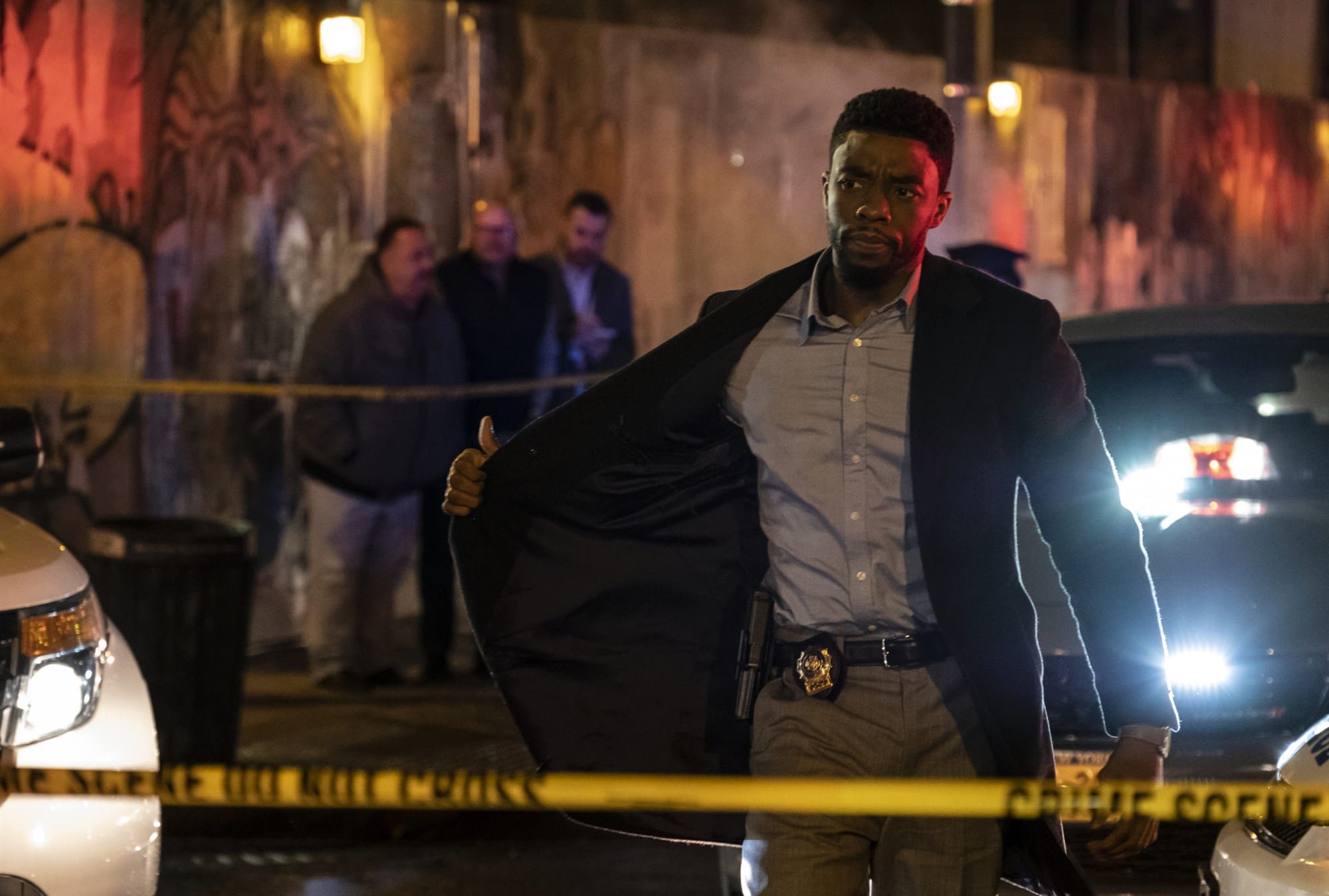
With the release of Knives Out this week and 21 Bridges last week, it seems the crime thriller is having a comeback. Where the former is a twisty whodunit à la Murder On the Orient Express or an episode of Murder She Wrote, the latter is more of a neo-noir. And while writer-director Rian Johnson’s film is getting deserved attention, director Brian Kirk’s film is equally worth seeing.
Produced by the Russo Brothers of MCU fame, it stars Black Panther himself, Chadwick Boseman as Andre Davis, a New York City detective who joined the force in honor of his father, who was killed in the line of duty 19 years prior. So, when two small-time criminals, Michael and Raymond (Stephan James and Taylor Kitsch, respectively) end up killing eight officers while stealing coke from the local cartel, it’s unsurprising when Andre becomes determined to catch them.
Though Andre is literally called an “avenger” of his father’s death, the character’s closest superhero approximation is actually Batman. Cold, brooding and not afraid to get violent considering the first thing we see adult Andre do is get reprimanded for his 8th shooting death in as many years, he’s as brilliant a detective as the Caped Crusader but without the costume or the fabulous wealth. At first, given those shootings, it’s hard to tell if Andre is a hero at all. On some level, that seems intentional on writers Adam Mervis and Matthew Michael Carnahan’s part. The audience is left to take Andre’s word that the shootings were justified, but given real world events, it’s perhaps easy to assume they weren’t considering the Internal Affairs agents in the film seem skeptical. However, both Andre’s and the agents’ race complicate that assumption and it falls to Boseman to convince the audience he’s our hero — which he’s well-equipped to do.
The second Andre arrives at the crime scene, we see how good he is at reading the clues as he deduces that not only were there two gunmen, but that they have military training. From that scene alone, Boseman makes is clear that even without knowing the reasons for the shootings, Andre is at least a competent detective. Rather the reason the audience is alerted to Andre’s record is that it justifies the moment when the commanding officer of the fallen cops, Captain McKenna (J.K. Simmons), essentially asks him to hunt and kill the gunmen. It’s a shocking exchange but also one that feels all too possible. While McKenna’s anger is on some level understandable, Simmons’ casting also inevitably suggests that the character has a more serious role than it first appears.
In fact, each casting decision feels like a deliberate play on the actor’s persona. Kitsch is a former heartthrob who headlined some notorious flops, so playing erratic, in recovery Raymond feels like he’s flouting that image. Stephan James, who plays Michael with a sympathetic air here, was a victim of systemic police discrimination in last year’s If Beale Street Could Talk. However, while the entire supporting cast is strong, Sienna Miller is it’s standout.
This isn’t the first time the actress has rubbed some dirt on her movie star glamor (this year’s American Woman, for instance), but it’s possibly her best. Her Frankie is shabby and no-nonsense and except for a line about “Becky with the good hair” that draws laughs for the wrong reasons, you believe she’s a real New Yorker. More importantly, you believe she’s as interested in finding the truth as Andre. When she asks him if he’s willing to shoot the suspects if necessary, unlike Simmons, you believe Frankie is asking because she genuinely wants to make sure her daughter doesn’t grow up without a mother — regardless of whether it’s true.
Indeed, while the performances are universally strong, what makes 21 Bridges more enjoyable than the average crime thriller is the way it trusts its audience to interpret the information it’s given and solve the case along with Andre. We learn what competent detectives Andre and Frankie are not because another character tells us, but through the way they, in rapid fire dialogue, figure out that not only is it unlikely the pair have gone far, but they must have gone to Manhattan. Their educated guess is quickly confirmed when they hear Michael and Raymond’s vehicle was spotted in Chinatown. It’s a brilliant sequence that not only establishes the characters’ skill and even chemistry as detectives, but delivers exposition in an enjoyable way.
That said, part of why that scene works is because the audience already knows Andre and Frankie are right and Mervis and Carnahan use that type of dramatic irony throughout to great effect. Whether it’s the way Michael and Raymond find out the status of the police’s hunt by hearing about it on the TV or radio or the way information we find out with one group of characters propels us into the next scene with the other set of characters, the audience is often one step ahead. And while the choice allows the audience to marvel at how clever the characters are, it also makes Andre’s realization that the cops might be dirty frustratingly slow.
Still, while much of the excitement in watching 21 Bridges is in the plot twists, Kirk’s film isn’t nearly as reliant as Knives Out on the element of surprise. Rather, the film feels like a throwback to ‘40s noir: solving the crime is only as fun as watching the hard-boiled detective figure it out too. Sure, it’s kind of easy to guess who the real villains are, but that’s not the script’s fault, it’s the sad truth of the real world that makes the story predictable.

